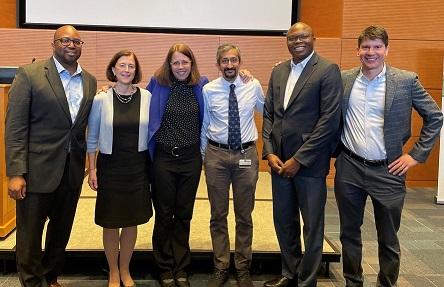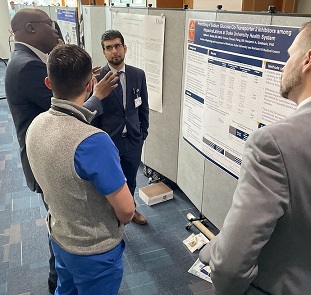
The Department of Medicine held its inaugural Research Day on Friday, April 28, with Chair Kathleen Cooney, MD, kicking off the event with a special Medicine Grand Rounds presentation about her research, Hereditary Prostate Cancer: From Gene Discovery to Clinical Implementation.
“The Department of Medicine is committed to moving medicine forward and part of this includes engaging in transformative research both basic and clinical that improves healthcare across the continuum,” Cooney said. “It’s important for us not only to celebrate and honor who we are as researchers, but to also share the magnitude of work that is currently taking place across the largest department within the Duke School of Medicine.”
Dr. Cooney is a medical oncologist focused on caring for men with prostate cancer. She is internationally known for investigations examining the genetic epidemiology of prostate cancer and discovered a recurrent mutation in the HOXB13 gene that increases the chances of being diagnosed with prostate cancer. Her current research focuses on identifying germline mutations associated with lethal and aggressive prostate cancer as well as prostate cancer in African-American men.
Dr. Cooney spoke about recognizing the role of germline mutations in prostate cancer susceptibility and discussed the relationship between DNA repair gene mutations and metastatic prostate cancer. She also identified new recommendations for germline genetic testing in some men with prostate cancer or men who are at high risk for the disease.
“There are so many exciting things going on across all of our divisions, so I think it’s really important, if not but once a year, to step outside of our usual circle of friends, make new friends, get ideas about new approaches for collaboration, research or just approaches to science,” Scott Palmer, MD, MHS, vice chair for research, told the group in his introduction of four faculty guest speakers.
The roster of speakers and their topics included:

Sudarshan Rajagopal, MD, PhD, associate professor, Cardiology, presented, Biasing Inflammation Through G Protein-Coupled Receptors. He discussed recent research from his lab that demonstrates news modes of signaling by receptors and its potential impact on drug development.
Opeyemi Olabisi, MD, PhD, assistant professor in the division of Nephrology, gave a talk entitled, APOL1-Mediated Kidney Disease: From Bench to The Community. African Americans represent 13% of U.S population but more than 35% of people on dialysis. Dr. Olabisi discussed how two common changes in the APOL1 gene explain a lot of the excess risk of kidney failure among African Americans.
Nwora Lance Okeke, MD, MPH, assistant professor in the division of Infectious Diseases, gave a talk entitled, Bringing Data Science and Implementation Science Together to Optimize the HIV Care Continuum. Dr. Okeke’s research program focuses on the use of patient-centered interventions and health informatics to optimize HIV care from prevention to comorbidity management. He also spoke about his efforts to diversify the HIV research workforce by engaging students at Historically Black Colleges and Universities (HBCUs).
Stefanie Sarantopoulos, MD, PhD, professor in the division of Hematologic Malignancies and Cellular Therapy spoke on B Cell Activation and Fate After Allo-Transplantation: Improving Immune Therapy for Patients with Hematological Malignancies. Dr. Sarantopoulos touched on her research with B cells aimed at improving the safety and efficacy of cell therapy for patients with cancer. Using information about the loss of B cell tolerance in chronic graft versus host disease after allogeneic hematopoietic stem cell transplant, she is working to identify anti-tumor binding antibodies.
The event concluded with an interactive poster session with more than 50 posters representing all of the Department of Medicine divisions.
Feature photo includes (left to right) Lance Okeke, Kathleen Cooney, Stefanie Sarantopoulos, Sudarshan Rajagopal, Opeyemi Olabisi and Scott Palmer.